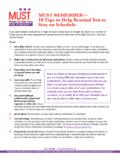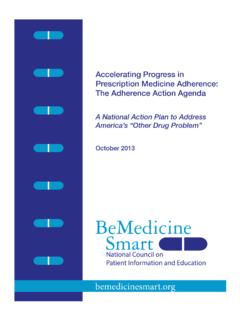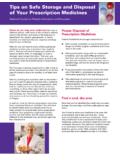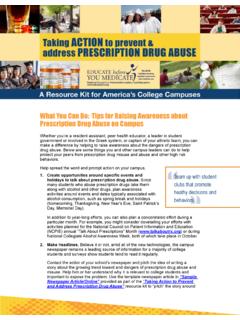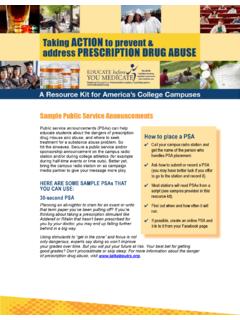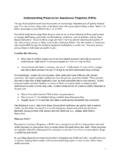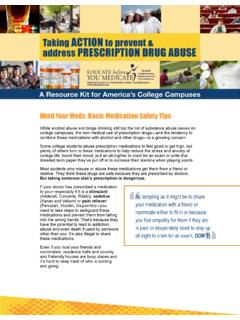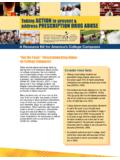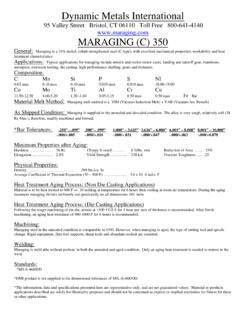Transcription of Role Playing Scenarios - NCPIE BeMedWise
1 DEPARTMENT OF HEALTH AND HUMAN SERVICES Substance Abuse and Mental Health Services AdministrationCenter for Substance Abuse Treatment Your Role as a Teen Influencer:What You Can Do To Help Prevent Teen Prescription Drug Your Role as a Teen Influencer: What You Can Do To Help Prevent Teen Prescription Drug Playing ScenariosBased on your anticipated audience and number of attendees, you will want to select from the following Scenarios to make your workshop more engaging and interactive. This activity will help give attendees a chance to translate what they are learning into practice by exploring how they would respond to different situations. It gives them the opportunity to develop effective strategies to educate teens about the dangers of abusing prescription drugs, dispel myths and help move teens toward positive decision-making and healthy doctor. Your 15-year-old patient asks you about getting a prescrip-tion for a stimulant that can help him perform better in school.
2 He says that he s tried his brother s ADHD medication a few times and that it really made a difference in how much he was able to get done. Based on your history with this patient, you know that he does not have ADHD or any other condition that makes this drug medically Your teen comes home after school and doesn t know you re there. You over-hear him talking casually with his friends about prescription drugs. Parent. You notice on your Internet site history that someone has visited several web sites that advertise easy access to prescription medications like pain relievers. Neither you nor your partner has researched this information. Your kids have access to the family computer after school. Parent/grandparent. You have a chronic pain condition, and you ve been keeping your prescription pain medication in your home medicine cabinet for several years. Recently, you ve noticed that some pills have been disappearing from the bottle. You have two teenagers living in your adult.
3 You are watching a popular movie or TV show with your teen. Some of the characters are joking about celebrities who abuse prescription drugs (for example, Rush Limbaugh, Michael Jackson, Heath Ledger, Elis or Anna Nicole Smith).1 DEPARTMENT OF HEALTH AND HUMAN SERVICES Substance Abuse and Mental Health Services AdministrationCenter for Substance Abuse Treatment Your Role as a Teen Influencer:What You Can Do To Help Prevent Teen Prescription Drug Your Role as a Teen Influencer: What You Can Do To Help Prevent Teen Prescription Drug Your child or student makes a comment that a prescription drug that was just advertised on television sounds really cool. Parent/teacher. It s nearing the end of the term. Your child/student is very anxious about upcoming final exams and papers, not to mention other school and family pres-sures. You recall that she recently mentioned one of her close friends sometimes takes a medication to help stay awake and concentrate. Teacher/school counselor.
4 A student who typically performs well at school seems to be having concentration problems and low energy. You overhear her in the restroom tell-ing a friend she s been taking some of her mom s pills to help her relax. When her friend tells her that s not a good idea, she responds by saying that it came from a doctor, so it s totally safe. Coach. You re aware that one of your star athletes has been trying to lose a little weight. You notice that he has a prescription (in his name) for a medication that com-monly causes weight loss. He is losing more weight than necessary and seems unchar-acteristically moody and irritable. You overhear from his friends that he is taking the medication more than once or twice a day. Some of his teammates are concerned about him, while others have expressed interest in getting similar help to lose or gain On the bus ride home from your latest match you hear several players talk-ing about a raging party this weekend. It s expected that many of the partygoers will be bringing whatever prescription medications they can find at home or from the medicine cabinets of older relatives or their friends parents.
5 Any. A group of teens at a local high school get caught selling prescription drugs to kids in the community. You mention it to your child/student and they respond by saying, I don t see what the big deal is. They re s not like you can t just buy them at the pharmacy. Any. You notice that your usually even-keeled child/student has become hyperactive, lethargic or exhibits other significant behavioral
